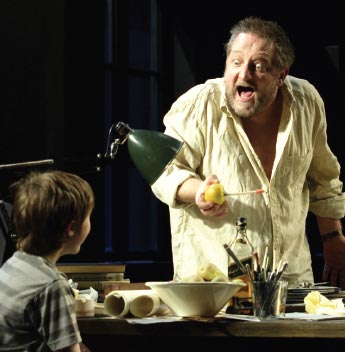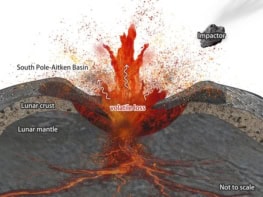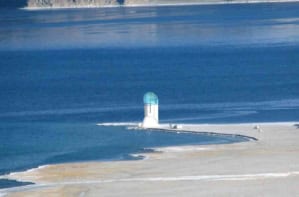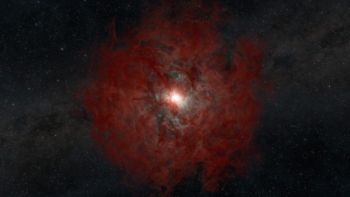The Life of Galileo
Bertolt Brecht
19 August 2006
National Theatre, London

In Bertolt Brecht’s The Life of Galileo, the ongoing conflict between rationalism and religious authority is portrayed through Galileo Galilei’s epic battle with the might of the Vatican. The play depicts the later years of the Italian astronomer’s life as he struggles to promote the ideas of Copernicus in the face of fierce opposition from the Catholic Church. In the 17th century, claiming that the Earth rotates around the Sun was tantamount to heresy; as the Italian philosopher Giordano Bruno found out to his cost in 1600, when he was burned at the stake for refusing to recant his heliocentric beliefs. According to Brecht’s Galileo, Bruno’s only mistake was that he had no proof.
Brecht (1898–1956) penned The Life of Galileo while exiled from Germany just before the outbreak of the Second World War. His purpose was to voice opposition to the fascist movement in his home country. Himself a communist, Brecht drew a parallel between the persecution of Galileo for his legitimate dissent and that of his comrades-in-arms, who bore the brunt of Hitler’s earliest purges. He later revised the play, in the light of the bombing of Hiroshima, to include more about scientists’ social responsibility. Brecht’s script was adapted and made more accessible by David Hare in 1994, and it is this version that has now been modified by director Howard Davies for a four-month run at the National Theatre in London.
In Davies’ production, the characters wear modern attire, which emphasizes the contemporary importance of the play’s major themes. Four centuries after Galileo, and 50 years since Brecht’s death, the relationship between faith and reason continues to be a difficult one, making the play as relevant as ever. Debates in the US courts over intelligent design and stem-cell research, as well as the realignment of religion and politics in the Islamic world, underline this.
Watching The Life of Galileo today, it is also hard not to draw parallels with the case of David Kelly, a scientist who, in voicing his expert opinion on Iraq’s weapons, was called before the political establishment of the day and forced to explain himself. Even today, we are reminded how the relationship between science and the political establishment can be a matter of life and death.
As a pure spectacle, The Life of Galileo is a fantastic advertisement for the joy of discovery. Despite his short and stout appearance, Simon Beale’s ranting and obsessive Galileo dominates the stage and the play. Galileo’s fanatical support for reason, and his frustration at the religious authorities, are expressed energetically by Beale. His explanations for observations of sunspots and mountains on the Moon have a verve and enthusiasm that makes one wonder why fewer pupils today are studying physics – particularly in the opening scene of the play where Galileo demonstrates the Copernican system to his housekeeper’s young son.
Besides this captivating central performance, the play is also an exciting audio-visual experience, benefiting from an impressive revolving set and atmospheric incidental music. There is also plenty of light relief, with a number of musical-style dance numbers dotted throughout the play, as well as some humour. Altogether, this makes for three hours of compulsive, compulsory viewing.
Perhaps the weakest point of the play is its ending. Despite being dramatically played out, the real consequences of Galileo’s recantation of the Copernican system in 1633 are not dealt with fully. In submitting to the Church, it is clear that Galileo placed a higher value on his own life than on the truth. If he had not backed down, he would have faced mortal agony, like Bruno before him; the horror of physical pain was enough to force Galileo to declare he was wrong. Perhaps only Galileo himself really understood the consequences of his recantation – the play leaves this stone unturned and the audience doubtful as to whether Galileo was ultimately a hero or, in the words of one his students in the play, “a selfish coward” who sold out his beliefs.
Freud once said that the distinguishing characteristic of scientific revolutions is their ability to knock human arrogance from a high pedestal to a lower one. But in The Life of Galileo, we watch how one individual, in possession of a revolutionary truth, is ultimately humbled by political authority. As the play depicts, in this case the truth did make it into the public domain, thanks to Galileo’s followers. Galileo’s most important book, Discourse on Two New Sciences, was smuggled out of Italy in 1638, while he was under house arrest.
The real value of The Life of Galileo, however, is that which Brecht intended: a reminder that however bleak the prospects, progress is only possible if dissenting spirit in the face of authoritarianism is continually renewed. In the words of Galileo himself: “In questions of science, the authority of a thousand is not worth the humble reasoning of a single individual.”
• The Life of Galileo runs until 31 October at the National Theatre, London. For further details see nationaltheatre.org.uk



